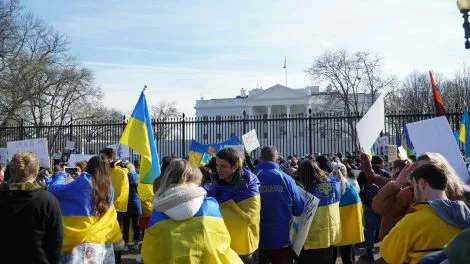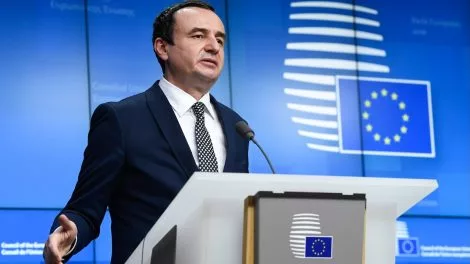Two major new reports suggest that the economic impact of Russia’s war on Ukraine, particularly increases in the cost of living, are beginning to have an effect on public opinion across the European Union.
The slowdown in growth brought about by Russia’s invasion of Ukraine is particularly pronounced in countries in close proximity to Ukraine, but other EU countries are feeling the pressure as well, according to a new report from the European Investment Bank (EIB).
- It’s crunch time for Ukraine’s EU aspirations
- Assessing the environmental impact of the war in Ukraine
- New support for Ukraine’s start-ups underlines importance of technology and innovation
The report analyses the economic shock caused by the war, and the ensuing fallout for households, firms, banks and governments, and finds that real economic growth in the European Union is now expected to fall below three per cent in 2022, down from the per cent estimated by the European Commission before the war.
The EIB warns that a recession is now possible, and that further trade disruptions or increased economic sanctions would increase the risk for the European economy.
“The EU economy’s recovery from the Covid-19 impact was still firming up when the war broke out. Heightened uncertainty and higher food, commodity and energy prices are impacting investment and sustainable and inclusive economic development,” says EIB VicePresident Ricardo Mourinho Félix.
“Maintaining good public policy coordination will be crucial to managing the economic impact of the war and will send a clear signal to markets, reducing uncertainty and tempering the risks of a new recession.”
Inflation triggered by the war could reduce real private consumption in the European Union by 1.1 per cent, although the impact will vary across countries.
The impact will be felt more in countries where consumption is more sensitive to energy and food prices and where a relatively large share of the population is at risk of poverty. Countries in Central and South-Eastern Europe tend to be more affected.
The increase in food and energy prices will hit low-income households disproportionally, but to varying extents across EU member states. Lower-income households in the richer countries of Northern and Western Europe are better able to absorb the price rise than households in Central and South-Eastern Europe, largely because savings rates and incomes overall tend to be higher.
“Inflation and higher energy prices pose a new risk to EU firms already weakened by the pandemic,” says EIB Chief Economist Debora Revoltella. “Our models show that in one year, the proportion of firms at the risk of default rises from 10 per cent to 17 per cent. In response, we need to implement clear policies to protect firms and ensure that public investment is fully used to catalyse private investment.”
Impact on business
EU firms, especially smaller ones, were weakened during the Covid-19 crisis. Their ability to withstand the withdrawal of policy support was already uncertain. The war will exacerbate firms’ vulnerability, through a reduction in exports, lower profits due to higher energy prices, and difficulty finding funding as banks avoid risk.
Firm-level simulations conducted by the EIB suggest the proportion of firms losing money will increase from eight per cent to 15 per cent in one year, and that the share of firms at risk of default will rise from 10 per cent to 17 per cent over the same period.
Chemicals and pharmaceuticals, transport, and food and agriculture are the sectors hardest hit. Firms in countries closer to Ukraine and Russia, such as Hungary, Poland, Latvia and Lithuania, will feel the pressure. Companies in Greece, Croatia and Spain will also suffer more than the EU average.
The impact on banks should remain contained, but firms’ access to external sources of finance may worsen.
Overall, the European banking system has little direct exposure to Ukraine, Russia and Belarus, except for a handful of banks. However, these banks have shored up their capital buffers sufficiently to withstand the write-down of some of their assets in Ukraine and Russia. Despite that, credit standards have started to tighten, especially in the Central, Eastern and South-Eastern Europe region.
Spending could rise as countries host refugees, implement redistributive measures to help households cope with energy price increases, and increase military spending.
Revenue is also likely to be lower than planned given the slowdown in economic activity, just as military spending is set to rise. Overall, budgets are expected to be most affected in EU members neighbouring Ukraine and in the Baltics, although the EIB suggests that funds available from the EU’s Recovery and Resilience Facility may give governments fiscal room for manoeuvre.

Shifting public opinion
The EIB’s analysis comes as a new survey by the European Council of Foreign Relations (ECFR) reveals that the public debate in Europe is turning away from events on the battlefield in Ukraine and towards questions of how the conflict will end, as well as its impact on people’s lives, on their countries, and on the EU.
The survey in nine EU member states – Finland, France, Germany, Italy, Poland, Portugal, Romania, Spain and Sweden – plus the UK found support for Ukraine remained high, but that preoccupations have shifted to the conflict’s wider impacts.
The findings suggest that European public opinion is shifting, and that the toughest days may lie ahead.
“The resilience of European democracies will mostly depend on the capacity of governments to sustain public support for policies that will ultimately bring pain to different social groups,” write the ECFR’s Mark Leonard and Ivan Krastev.
“This will force governments to balance the pursuit of European unity behind pressure on Moscow with opinions that diverge both inside and among member states. The survey reveals a growing gap between the stated positions of many European governments and the public mood in their countries. The big looming divide is between those who want to end the war as quickly as possible and those who want to carry on fighting until Russia has been defeated.”
Unlike many news and information platforms, Emerging Europe is free to read, and always will be. There is no paywall here. We are independent, not affiliated with nor representing any political party or business organisation. We want the very best for emerging Europe, nothing more, nothing less. Your support will help us continue to spread the word about this amazing region.
You can contribute here. Thank you.

Published by: emerging-europe.com




